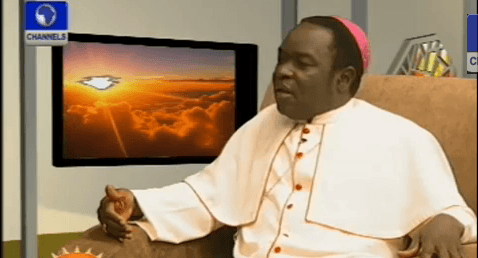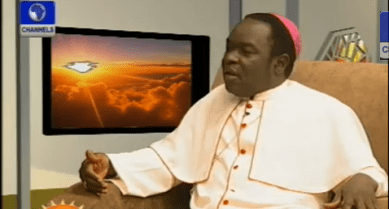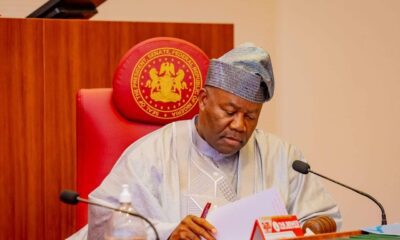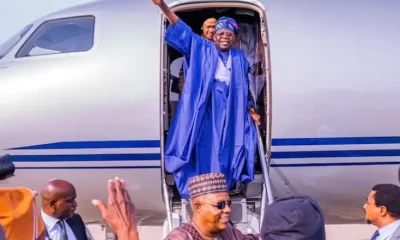National Issues
Bishop Kukah: Rabble-rouser for peace -By Emmanuel Ojeifo

“Gregarious yet serious, intellectual but down-to-earth, small and compact but bursting with enough energy for two men, Father Kukah is somewhat of a phenomenon… He travels the world and is on good terms with the present and past heads of state; he is the local boy who made good, a symbol that it is possible for someone from this forgotten part of Nigeria to make a mark.” – Karl Maier, This House Has Fallen (2000).
Today, December 19, one of Nigeria’s finest public intellectuals, Bishop Matthew Hassan Kukah, will clock four decades minus two in the priestly service. Providentially, on this same day his Diocese of Sokoto will be 50 years since it was erected in 1964. If Bishop Kukah decides to celebrate his own priestly anniversary then it will be a double celebration. Otherwise, it will only be the grand finale of the Golden Jubilee of the diocese.
When I left his presence three Wednesdays ago, I was more than convinced that the Catholic Church in Nigeria needs an aggregate of 10 of Bishop Kukah’s type to push forward a project of social transformation and national rejuvenation, inspired by the tried and tested tradition of Christian Social Teaching. It was this tradition that Pope John Paul II employed in the 80s to wrestle with Communism in Poland until he helped to bring that infamous system of government to its knees. It was the same tradition that the murdered Salvadoran Archbishop, Oscar Romero, applied to champion the cause of the liberation of the people of Latin America. A newspaper reporter once asked Romero if he was aware that people wanted to kill him and he replied, “You can tell them they are wasting their time. They can kill a bishop but they cannot kill the people of God, the Church. If I am killed I will rise again in the Salvadoran people.” He was killed on June 24, 1980 while celebrating Mass in a Church for the poor people of his country.
When the charismatic Filipino Cardinal, Jaime Lachica Sin, applied this same Social Doctrine in his home country, it also achieved unprecedented results. He was instrumental in the 1986 People Power Revolution, which toppled the corrupt regime of President Ferdinand Marcos and installed Corazon Aquino as his successor. He did it again in the 2001 EDSA Revolution that brought down the government of Joseph Estrada. It was through this same lens that I fixed my gaze on the man who has become the unofficial poster-child of the Catholic Church’s public image in Nigeria as we chatted over two cups of Coffee in the office complex of his new Centre, located on the metropolitan district of Wuse II, Abuja. After about 30 minutes chat on sundry issues, from journalism and politics to social activism and intellectual strivings, Bishop Kukah went into his room to pick his briefcase. He had an appointment with the Apostolic Nuncio, the Pope’s Ambassador to Nigeria, and didn’t want to run late. He also had an afternoon flight to catch to Sokoto that same day. With phone calls coming in and going out, he managed to have a stable discussion with his acting Director of The Kukah Centre (TKC) on how to get the invitation cards across to the personalities invited for the public presentation of TKC. When we finally parted, I felt highly inspired.
TKC is the brainchild of Bishop Matthew Hassan Kukah. It was established in 2008 but opened its operations in Abuja barely two years ago. Its goal is to provide a platform for national conversation on the three-pronged issues of faith, leadership and public policy. It aspires “towards the attainment of a more humane, democratic and free society where citizens can live in real and true freedom, unencumbered by any structures of exclusion on the basis of ethnic, religious or gender differences.” In line with the foresight of its intellectual pathfinder, TKC believes that the pursuit of the Common Good of all citizens should be the basis for the existence of government, and that citizen participation in their own affairs should be at the heart of governance.
Since it came to public light, TKC has hit the ground running, as Nigerians love to say. It has organized many robust discussions on critical national issues, and each of these events has attracted a wide cross-section of Nigeria’s political, religious, intellectual and traditional leaders. Even the formal launch of TKC on December 9th this year was no less attended. President Jonathan, General Gowon and a host of Ministers, Ambassadors and other high profile religious and traditional leaders were all in attendance.
For TKC, “leadership is a shared responsibility, not to be left to the hands of political office holders.” It must be the product of a well-thought-out synergy between the government and the governed. For this reason, TKC urges citizens to abandon cynicism and indifference towards politics and to engage government at various levels in a bid to promote inclusiveness in the governance process. So far, because of the international reputation of its founder, TKC is carving a niche for itself in the ranks of foremost think tanks in Nigeria. This is the vision of a man who knew what he was going to do with his life after his exit from the office of Secretary General of the over 20-million member Catholic Church in Nigeria, in the year 2000. His tenacity and foresight propelled him to expand the horizon of his knowledge.
In 2001 he found his way to Oxford University where he spent the following two years as a Senior Rhodes Fellow, pursuing cutting-edge scholarship in politics, religion and society. When he left Oxford in 2003, he enrolled at the Kennedy School of Government in Harvard University, where he worked on a Masters degree in Public Policy, in addition to a PhD in Politics and Religion, which he earned in 1990 from the prestigious School of Oriental and African Studies (SOAS) in the University of London. These intellectual achievements were given depth of experience with his participation in four national initiatives: the Human Rights Violation and Investigation Commission (HRVIC), otherwise known as Oputa Panel, the National Political Reforms Conference, the Shell-Ogoni Reconciliation Committee and the National Electoral Reforms Conference.
When the time came for TKC to take-off, a heavy burden came upon Kukah’s shoulders with his appointment in 2011 by Pope Benedict XVI as Bishop of Sokoto. For those who shared his dream of establishing TKC, it seemed to them that the coming of the bishopric sounded the death knell for a centre that died before it was born. Kukah thought otherwise. In his debut letter of gratitude to Nigeria and Nigerians after his episcopal ordination, published in The Guardian of October 11, 2011 he reassured everyone of his commitment to continue his work of championing the cause of justice and peace. For those who expressed their fears that he would no longer be available for public engagements, he said: “The Church has only given us a bigger platform. As long as injustice and hunger stalk this land, we shall continue with the struggle. We shall go to where the Lord sends us. Since God is everywhere, I shall consider myself a bishop without borders.”
Surprisingly, in the last two years, Kukah seems to have had more public engagements than all the years of his priestly life put together. He has been nothing less than a bishop without borders, criss-crossing the length and breadth of Nigeria and beyond to spread the Gospel of peace. If he has made a name for himself, it can only be the unintended side effect of applying himself passionately to the cause of promoting the Common Good. For a man who has described himself as “an extraordinarily privileged Nigerian” coming from a village in the middle of nowhere, to rise to such great heights is no mean feat. Beyond a knack for excellence that seems to have been built into his DNA, Kukah always attributes his life’s successes to God’s benevolence and grace. Those who know him very well cannot understand why such a perceptive political interlocutor-in-cassock would vehemently refuse to run for the office of President of Nigeria. Kukah knows he is certainly not cut out for such. He once wrote in an essay published in The Guardian: “I consider myself a public intellectual with a duty to interrogate politics and political behaviour as part of the process of nation building. I am political because I am human, but not a politician because I am a Catholic priest!”
Kukah sees himself as only a midwife who wants to help birth a new Nigeria. In his 18-minute speech at the 2010 edition of TEDxEuston in London, speaking about his conviction, he made it aptly clear: “My definition of a priest is that it is impossible to be a priest and not be concerned about the social issues of the moment.” In October this year, he received the Outstanding African Leadership Award in Amsterdam for his “commitment to righteousness and upliftment of social and moral values in Nigeria and the rest of the world.” I hope that someday in the nearest future the Nobel Peace Prize will come home!




















